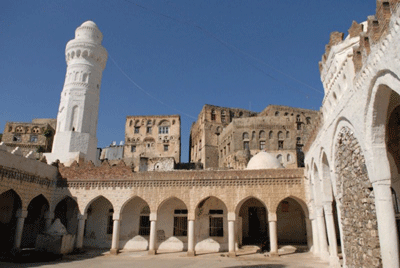
Mosque in Jiblah, Yemen
There was a time when books were hard to come by. Either they cost too much or were inaccessible in a private or exclusive university library. Whatever else the world wide web has done (and that is a mouthful), it now functions as an archive. More and more, the rare and out-of-print books I used to be forced to read in a library reading room are becoming available online. Mr. Gutenberg might roll over in his Grab at the very thought of a pdf file, but print has taken a new and universal turn. I especially enjoy the “flipbook”, which simulates turning the pages of images of the original. For an enjoyable read on the early history of Yemen, there is the flipbook version of Henry Cassels Kay’s translation called YAMAN, ITS EARLY MEDIAEVAL HISTORY, published in London in 1892. This has excerpts (not always trustworthy in their translation) from Umarah ibn Ali al-Hakami (1120/21-1174), Ibn Khaldun (1332-1406); Muhammad ibn Yaqub al-Janadi (d. 1332?).
The sad thing is that well over a century ago, Kay lamented that there was virtually nothing available on the history of Yemen, which had become of strategic interest to the British empire. I say sad, because the same can be said today. There is no single, critical history of Yemen’s Islamic history in English or another European language, while there are many historical texts written by Yemenis. Here is Kay’s comment:
The history of the Arabs of Yaman under Islam has, as it seems to me, hitherto received less attention from Western scholars than it may fairly be said to deserve; and hence it no doubt arises that readers desirous of information on the subject, find their endeavours to obtain it attended with almost insuperable difficulty. Lists of the dynasties have been included by Mr. S. Lane-Poole in his Catalogue of Coins at the British Museum, and he has added such brief explanations as the special purpose of his work would permit; but, with that exception, the subject is in English literature simply a blank. And the labours of continental scholars, it must be added, are in this particular case, of less assistance than might be expected.
The book is worth reading for enjoyment, although the serious scholar should retreat to the original Arabic texts, which are available (perhaps even online these days). Here is one of the anecdotes, combining poetry and sabre-rattling:
I have been told by the Da’y Muhammad ibn Saba, that he was out on one occasion with a reconnoitring party for Saba. They came in sight of Aly ibn Abi al-Gharat and of his uncle Mani’ ibn Mas’ud. No horse, said the son of Saba, ever carried braver or bolder men than these two. ” “We took to flight,” he continued, “but we were overtaken by Mani’ ibn Mas’ud.” “Tell your father, youth,” he shouted, ” to stand firm, for this evening there shall surely be kisses bestowed upon us by the Jushamite maidens within his tents.” When I informed my father of these words, he rode forth in person and addressed the Banu adh-Dhib, who were present, and who were his nearest kinsmen: “The mercenary Arab horsemen (their allies) were not equal,” he said,” to the heat of battle. Fire can be mastered only by him that kindles it. Meet your kinsmen and bear the fierce heat of battle yourselves, otherwise there is nought before you but defeat and disgrace.”
The two armies joined in action and one of our horsemen, charging Mani’ son of Mas’ud, dealt him a thrust with his lance, which divided his upper lip and the extremity of his nose. The battle raged on both sides with lance-thrusts, heavy blows of the sword and the destruction of horses. The assembled Arabs looked eagerly on, but the Banu Hamdan at length charged, and interposed themselves between the two parties. At the same moment, the combatants were separated by the Lahj, which came rushing in a torrent down its bed. The two parties stood still on either bank of the stream, conversing with one another. The Da’y Saba, or some other person, turned towards Mani’ ibn Mas’ud. “What sayest thou,” he asked, “Abu Mudafi’, of the Jushamite maidens’ kisses this evening ? ” “I say of them,” answered Mani’, ” as has been said by the poet al-Mutanabbi:
“Lance-thrusts to those that love them are as kisses.” ”
Mani’s answer has ever since been greatly praised and admired, by reason of the aptness of his quotation to the circumstances.
[Tabsir Redux is a reposting of earlier posts on the blog, since memories are fickle and some things deserve a second viewing. This post was originally made Friday, May 21, 2009]
Daniel Martin Varisco